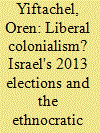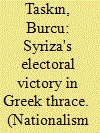|
|
|
Sort Order |
|
|
|
Items / Page
|
|
|
|
|
|
|
| Srl | Item |
| 1 |
ID:
107913


|
|
|
|
|
| Publication |
2011.
|
| Summary/Abstract |
This study examines the effect of electoral victory in 1988 and electoral defeat in 1992 on the party organization structure of Israel's Likud Party. Until recently, most researchers on party organization claimed that electoral defeat causes organizational change, while other scholars found that victory, too, can generate change in party organization. The present article studies the effects of electoral defeat versus electoral victory on party organization. Findings reveal that, following victory, the Likud became more factional, with intra-party power struggles, leading to a more equal distribution of power. Electoral defeat changed the dominant coalition and leadership, resulting in a more oligarchic structure.
|
|
|
|
|
|
|
|
|
|
|
|
|
|
|
|
| 2 |
ID:
128057


|
|
|
|
|
| Publication |
2013.
|
| Summary/Abstract |
Israel's 2013 Knesset elections, in which the incumbent ruling party was returned to power for the first time in a quarter-century, were noteworthy in several respects. The basic divisions of Israeli politics into geopolitical and socioeconomic blocs were unchanged, only small electoral shifts being registered. On the other hand, as this article shows, Prime Minister Benjamin Netanyahu barely achieved an electoral victory despite his overwhelming preponderance in public-opinion polls. Due to the rise of the new, personality-driven Yesh 'Atid party and the latter's unlikely alliance with the settler-based Jewish Home, which together garnered as many Knesset seats as the winning Likud-Yisrael Beitenu list, for the first time in decades Ultra-Orthodox parties were excluded from the winning governing coalitions for the first time in decades. The elections were marked by the near-invisibility of the Palestinian issue and Palestinian citizens of Israel. The article concludes that the continuing governing consensus in favor of "liberal colonialism" is unsustainable, although exploiting the "cracks" in that consensus is difficult and unlikely in the short term.
|
|
|
|
|
|
|
|
|
|
|
|
|
|
|
|
| 3 |
ID:
153598


|
|
|
|
|
| Summary/Abstract |
This article, based on the link between institutional changes and voter behavior, focusing mainly on the 2015 parliamentary elections in Greece and the SYRIZA party's success in Greek Thrace, aims to understand why the Muslim minority voted significantly for SYRIZA and how they managed to send four Muslim representatives to the Greek Parliament, three of them from the same party. The article argues that, although there is massive support for radical-left SYRIZA due to its electoral promises to improve social services in addition to the party's rational candidate nomination, this support reflects a mixture of sociological and issue-voting behavior of the Muslim minority related to their motivation for political representation rather than an ideological shift. The changing political system in Greece since 2012, from a two-party to a multiparty system with decreasing voter turnout, increased the impact of the Muslim vote on electoral results in the September and January 2015 elections; however, it also increased social tension between the majority and the minority.
|
|
|
|
|
|
|
|
|
|
|
|
|
|
|
|
|
|
|
|
|